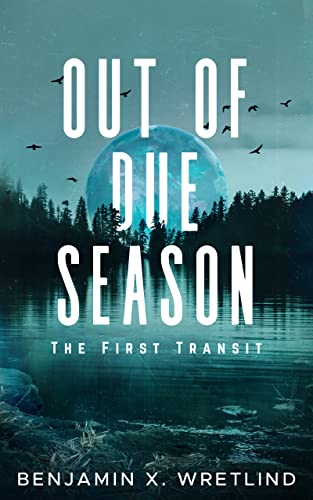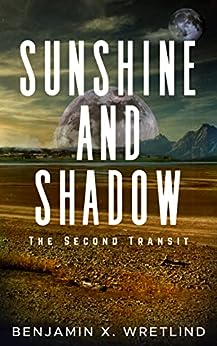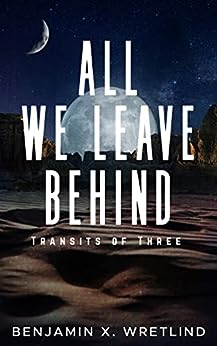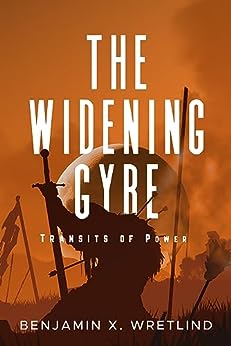This week on the Mystery Review Crew we are honored to have Author Benjamin X. Wretlind for an Author Interview! We found Benjamin X. Wretlind through a mutual friend and grew to be very intrigued by his out-of-the-box way of writing and his background in weather forecasting!
Here is a bit about Benjamin X. Wretlind
Benjamin X. Wretlind is a speculative fiction author who writes science fiction, dark fantasy, magical realism, and some horror. He has been–at different times, of course–a fry cook, range boy, greens maintenance technician, reservations agent, room service attendant, editor, banquet server, meteorologist, instructor, program manager for Internet applications, curriculum developer, training simulation engineer, leadership facilitator/coach, process improvement consultant, learning manager and organizational psychologist. He currently builds and facilitates leadership courses at Yale.
Benjamin is the creator of the Transit series of novels, which has been called “an engaging, personality-driven tale with detailed SF worldbuilding.” He has written and published many novels, collections, and the weirdest creative writing book ever. Owing his life’s viewpoint to Bob Ross, he has also painted a few things, thrown a few paintings away, and probably has a painting on an easel right now. Oh, and he loves woodworking, too.
It’s all about creating.
Benjamin lives with his wife Jesse in Colorado.

How Benjamin X. Wretlind Writes Unforgettable Stories That Make Us Think
What was the first story or piece of writing you remember creating? How has your writing evolved since then?
The first piece of writing I remember completing was a story about a banyan tree in my uncle’s yard that didn’t want to be cut down. In the end, the banyan tree lost. I was never a fan of always having happy endings. I was eight, and my mother–saver of all things–mailed that original story to me several years ago. Since then, I knew I wanted to be a writer but I’d have to say my style has changed dramatically. For one thing, that story was about 200 words and my latest novel draft is around 130,000. Maybe I’m more verbose, but the not-always-happy ending is still there.
Are there any specific authors or books that influenced you early in your writing journey?
The biggest influence on my early writing was Ray Bradbury. I’ve always been a fan of Bradbury ever since I stole a copy of my brother’s Martian Chronicles from his bedroom and started reading about the “Rocket Summer.” There are no words really to describe my complete fascination with that first opening chapter, but I find myself feeling the same every time I pick up one of his books, most notably Dandelion Wine. Perhaps it was the description of the “Happiness Machine” I read about or the oration given about living the life we have now and not a life we can’t have. Perhaps it was the feeling of being on a street in summer in Green Town, listening to the bees buzz, the apples fall, the susurrus of the wind through brilliant leaves. I told myself then (and tell myself now): if I can write like that, I’ve made it.
How do you approach the process of generating new ideas and translating them into fully-fledged stories?
I can’t really say where the idea for my novels comes from, but once I have an inkling of a plot, I immediately write it down. For example, I recently happened to be doom-scrolling and came across an article about what would happen if the power went out in Phoenix during this past summer. I scribbled out the question and then stared at it for a while. I now have a full novel idea (in the realm of cli-fi) which I intend to write up someday. I put the idea into a folder of ideas to get to and then noddle on it for a while before actually writing the first sentence.
Are you a planner or a “pantser” (writing by the seat of your pants)? How do you approach structuring your stories?
I am a plotter, something that’s ingrained in me and won’t go away. When I have an idea, I usually write up a book cover blurb first (without spoilers) and then convert that into part synopses (exposition through denouement). From there, it’s a matter of breaking down the parts into chapter synopses and finally scenes and scene beats. It’s not a short process, but it keeps me on track as I write out the novel.
Do you have a favorite genre or style to write in, or do you enjoy experimenting with different forms of storytelling?
Going back to my early reading days, I have to say that I have been a fan of science fiction and fantasy since the beginning. Bradbury’s Martian Chronicles and Michael Ende’s The Neverending Story are to of my all-time favorites, as is Robert Holdstock’s Mythago Wood. Because of that, I have a tendency to write my novels into those two genres, but I do stray…a little. I think I would classify all of my work as speculative fiction (ranging from sci-fi to fantasy to magical realism) because I’m not a fan of reality. If I were to plot out a “normal” story, I would probably throw in a ghost or some deus ex machina that pulls me back into that speculative world.
How do you capture and convey emotions in your stories to connect with your readers on a deeper level?
One of the ways I try to capture emotion in a story is to use the environment to create an atmosphere that matches the emotion or contrast it with whatever a character is feeling. I was a meteorologist for a long time, and I believe that weather is one of the best ways we have as writers to build that atmosphere into our writing. You think of a sad character. Does it help your reader feel the emotion if you have a perfectly sunny and temperate day, or would it be better to have undulating clouds hanging over the scene like a smothering blanket. Weather is something we all experience, and we all experience in much the same way. So by using something that a reader can identify with, we have the chance to have them feel our characters’ emotions. I’ve written extensively about this and even have a nonfiction book out on the subject–Creating Atmosphere with Atmosphere.
How do you approach writing dialogue to make it feel authentic and engaging for readers?
A small portion of my writing has been screenplays. Bad ones, but you have to learn the craft somewhere. Writing dialogue in novels–for me–is a lot like how I would approach dialogue in a screenplay. I see a movie or television show in my head and write what I think the character would say. When it comes to dialogue tags, I like to use action to indicate who’s speaking rather than “said” or “grumbled” or “whispered.” I still use those tags, but not as much as I could. For me, dialogue is an extension of the screenplay with the appropriate parentheticals to indicate how someone should be saying something.
What do you hope readers take away from your stories? Is there a particular message or feeling you aim to convey?
In my “pet” project, the Transit series, I hope to answer the question: What would happen if society had a chance to start over? Would we make the same mistakes? I’ve just finished the first draft of the fourth novel (there are nine outlined), and in each of them, I’m focusing on certain aspects of sociology which may eventually lead to an answer to that question. I didn’t want to just write a novel and be done with it; I wanted to explore what might happen in our future by looking through the lens of the past. For that reason, the novels fall into the realm of anthropological science fiction, but they have been called mysteries and thrillers. My hope is that readers come away with questions of their own, such as what might happen if we didn’t do that thing or we did that other thing instead? We probably won’t ever have the chance to start over as a society, but does that mean we have to continue down the same path we’re on?
How do you balance between creating stories that resonate with you personally and writing for a broader audience?
This is hard. I’ve never been a fan of writing to market. I always wanted to write stories that resonate with me and hope that there are some readers out there who might also feel the same. I recall years ago several rejections from one agent (on several novels) that all basically said “It’s really good, but I don’t think I can sell this in the current market.” That’s probably true. I am a reader, and the books I gravitate toward are not those that fall into a current trends. Maybe I have a sort of psychological reactance to those publishers who attempt to dictate what I should or shouldn’t read. I think that drives what I eventually write.
Do you prefer coffee or tea? What kinds, or specific ways to enjoy these drinks?
Coffee. Black. It’s a simple thing, but recently I’ve also been limiting my caffeine intake. Outside of that, I have a bottle of water nearby always. I’m pretty boring when it comes to drinks.
What advice would you give to aspiring authors who are just starting their writing journey?
- This is a marathon, not a sprint. Take a breath.
I started my first book when I was in high school. Twenty-some years later, I finally finished it…after having written another book that took seven years and starting a third. Life will get in the way, and unless you compartmentalize your writing, you may have problems finding the time to do what you dream. It’s okay to write a book a month, a book a year, or a book a decade. You’re not competing against those who can write a book a week.
- Celebrate the success of others and support everyone.
I have tried my best to do this, if not verbally, then mentally. The success of others is important, not only for them but for you. When another writer is proud of a review, be proud with them. When they cry, cry with them. I started a program on my blog where I buy, read, review and market 12 books by Indie authors who need that support and encouragement. If they succeed in achieving their dreams, then I’m happy for them.
- It doesn’t matter if you get a bad review; your work is not for everyone.
This was the hardest lesson for me to learn until I finally separated myself from the work. An attack on my books is not an attack on me. Everyone has likes and dislikes. If you think the big-name authors don’t get bad reviews, look again. There are some mean people out there, but you can only control your reaction to their behavior.
Is there a specific genre or writing style that you haven’t yet explored but would like to try in the future?
Believe it or not, I would like to try romance. I started a story that would fall into the realm of science-fiction romance, but I couldn’t get very far. It’s still in my to-do folder, and I will eventually get to it. I’m not a fan of romance novels, though, so it’s something I’ll really have to research. The hardest part, I know, will be the idea that romance must have a “happily ever after.”
Thanks so much for letting us interview you, Benjamin, we enjoyed getting to know you a bit better through this interview.
In the literary realm of Benjamin X. Wretlind, we find ourselves traversing through worlds where different groups of characters grapple with immediate danger, their present nightmares, and the challenge of finding a possible home. His stories unfold in an unfamiliar environment, he takes us amidst the remains of an ancient temple lost, in the deserts of the planet, or in a distant canyon far far away. With different ideas and perspectives, each his protagonist must discern the best course of action. Through his collection of evocative short stories, Wretlind explores the human quest for a final home, our sociological ideals, and the promise of a great return. In every short story he weaves, the reader is transported into the depths of imagination, where the lines between reality and fiction blur, leaving us with a profound appreciation for his storytelling prowess. Benjamin X. Wretlind’s literary world is an exploration of the human condition in all its complexities.
Check out some of Benjamin X. Wretlind’s latest books:
The Transit Series:
As humans transit from one world to the next, the societal mores and norms will continue, but at what cost? As broad as The Foundation series and as deeply interconnected as The Expanse, The Transit series takes the reader on a journey to another world and beyond. What if humanity had a chance to start over? Would we follow the same paths or forge new ones?
The First Transit Series Book:

A dead man floating in a remote lake. A second gruesome discovery. Will submerged secrets alter the course of humanity?
The Second Book in the Transit Series:

Devastation looms. When their peaceful planet turns against them, can these surviving descendants from Earth survive an increasingly hostile home?
Miriam Michaels is not ready. Forty years after her grandfather followed a cult prophet through a wormhole, she worries about being set adrift in the new world’s community. And as a relentless rain continues to beat down, she fears the rising floodwaters will destroy their way of life.
The Third Book in the Transit Series:

Not all of them made it out of the floods alive. Can those who remain survive on a planet turned deadly?
Miriam Page is guided by hope. With their people broken into three factions, the young leader of the decimated faithful is determined to find a new home by following an ancient map. But the infernal elements and unforgiving landscapes turn hellish when she contracts a debilitating disease.
The Fourth Book in the Transit Series:

From the ashes of common ancestors, can new societies forge a united path?
When Amos, exiled from the Col’kasid, is discovered by a scout team from an unknown tribe, he finds himself embroiled in a struggle for peace. Together with Kaius, a New Emilian with a checkered past, and Gideon, the great-grandson of the founder of the Col’kasid, they face a daunting task: bridging the divide between two societies with vastly different beliefs and histories.
But as the three tribes try to find common ground, new dangers emerge from the shores of the Barren Sea. The Zhanshi, a tribe formed from blood, has been waiting for a chance to arise as the only power on the planet. With the discovery of a ship that brought their ancestors from Earth, their technological advancements are stronger than ever, and they are ready to wage war.
Did you love this Author Interview? Then see more of them by searching for Author Interviews in the bar at the top of this page.






I’ve read and reviewed all of Wretlind’s books, and have been hooked since the beginning. For some of the Transits you must have a strong stomach or a test reader to tell you when to take a deep breath, and then dive in again. This is a great interview, and is for authors as well as readers.